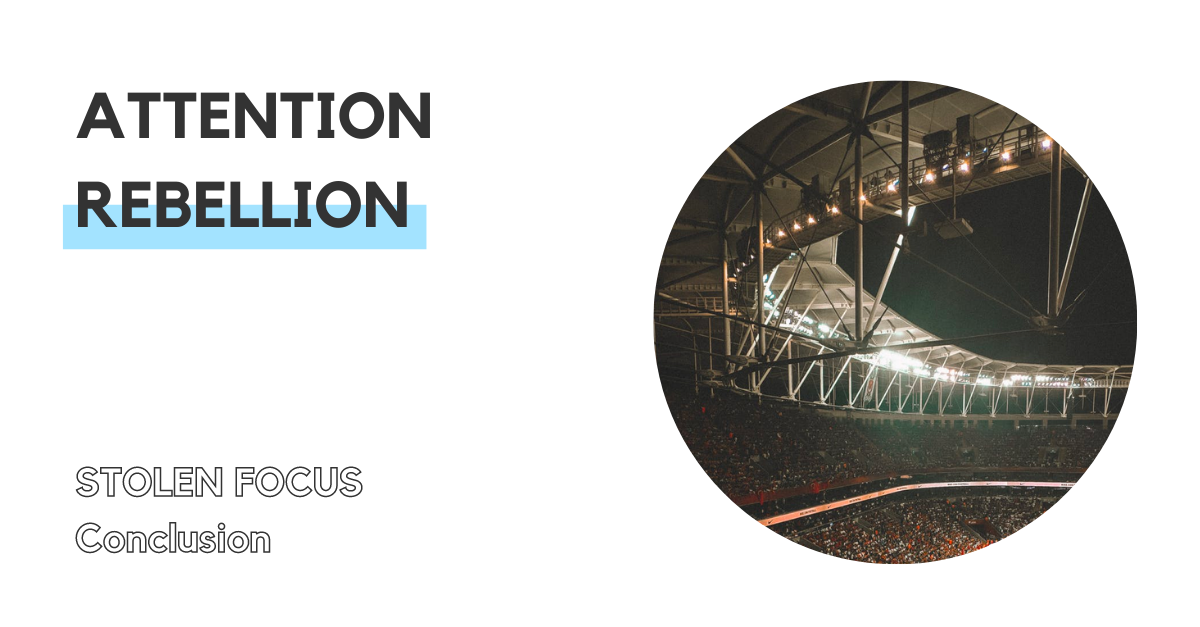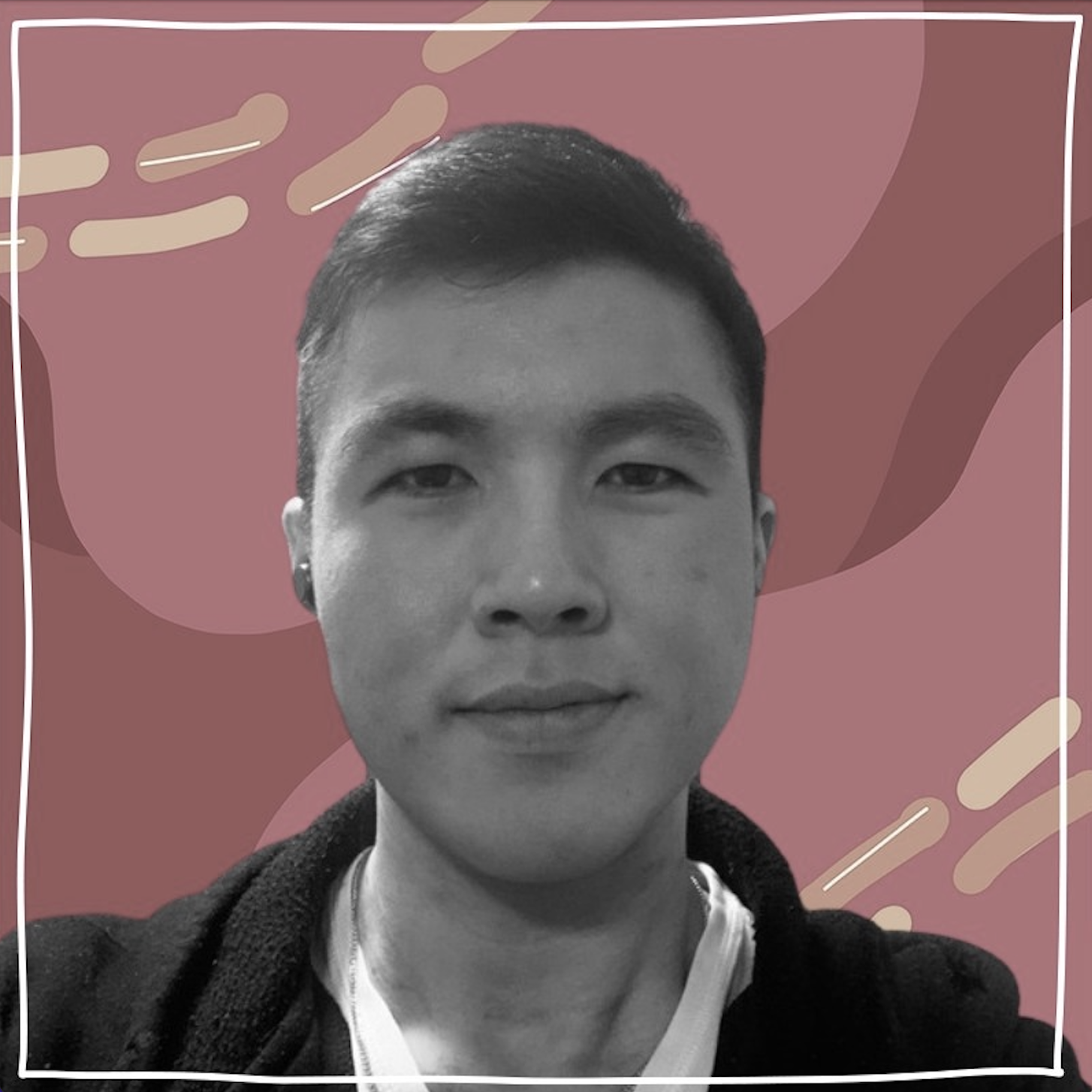‘[We] never needed our ability to focus… more than we do at the moment’ – Stolen Focus, Conclusion Notes
Posted on: June 19, 2022
Post Category: Book Notes

About #onepageonepoint
#onepageonepoint aims to summarise new ideas from books on personal and professional development – with (approximately) one point for each page. Read more about this project here.
Today for #onepageonepoint, we have summary notes for the conclusion of Stolen Focus – ‘Attention Rebellion’.
If you are interested in getting yourself a copy or learn more about the book, click here.
Conclusion: Attention Rebellion
- James, after years of studying focus, describes three types of focus (that are being stolen from us): (1) spotlight (focussing on immediate actions with directed attention), (2) starlight (focussing on longer-term goals), and (3) daylight (figuring out our longer-term goals and making sense of ourselves).
- Distracting your daylight will make you obsessed with petty goals or simplistic signals from the outside world, such as likes and retweets. Both starlight and daylight require reflection, mind-wandering and deep thought.
- Hari also proposes another type of attention which can be defined as our stadium lights – ‘our ability to see each other, hear each other, and to work together to formulate and fight for collective goals’ (Hari 2022, p. 262).
- During Johann’s experience with the lockdowns in the UK, he used the following six ways to manage his attention.
- First: using pre-commitment to stop switching tasks so much i.e. making certain behaviours harder to perform in the future. He accomplished this by storing his phone in a kSafe and blocking websites using Freedom.
- Second: changing his response to distraction. To get into the flow state more easily, he acted on tasks that answered the following questions: What would be something meaningful to me that I could do now? What is at the edge of my abilities? How can I do something that matches these criteria now?
- Third: taking six months of the year totally off social media – after publicly announcing that he is going off, and having a friend change his passwords.
- Fourth: letting his mind wander to think over the past, game out the future and make connections between different things. He allows this by going for a walk for an hour everyday without his phone or anything distracting.
- Five: sleeping for eight hours day after a nighttime ritual where he unwinds. For his ritual, he avoids screens for two hours before bed and lights a scented candle.
- Six: spending most of his time with his godchildren and younger children, and allowing them to play freely (without being managed or supervised) – to build a foundation for their focus and attention.
- In conjunction with these six ways, he also cut out processed foods, meditated everyday, invested time in slow practices like yoga, and took an extra day off each week.
- You can focus on individual efforts to improve your attention but they are dwarfed by an environment full of things that wreck it – stress during a pandemic, financial insecurity due to a pandemic, incompetent political leaders during a pandemic making us hypervigilant, etc.
- Naomi Klein, a political writer, and Hari (2022, p. 266) explain ‘We were on a gradual slide into a world in which every one of our relationships was mediated by platforms and screens, and because of Covid, that gradual process went into hyper-speed… And all the while, the algorithms of surveillance capitalism were altering us – tracking and changing us – for many more hours a day.’
- With the different factors at play that deteriorate our attention (pollution, poor diet, distracting social media platforms, etc.), there is a high need for us to band together and fight back – if we want an alternative way to live and work towards replacing these forces with ones that heal our attention.
- Our attention is like an orchid, it requires great care, otherwise it will wither.
- A movement to reclaim our attention might involve: (1) banning surveillance capitalism (to stop people from being hacked and deliberately hooked), (2) introducing a four-day work week (to reduce chronic exhaustion and improve attention) and (3) rebuilding childhood by allowing them to play freely without imprisonment in their homes (to build a healthy foundation for attention).
- A successful movement requires a ‘site battle’ – highlighting the problem through an event of conflict.
- Based on data from the 1880s, ‘every decade since, the way we experience the world has been getting faster and we focus on one topic less and less’ (Hari 2022, p. 272). Thomas Hylland Eriksen explains that this can be explained in part by our society’s fixation on economic/GDP growth – where economic growth happens in two ways: by expanding into new markets or convincing consumers to consume more.
- Eriksen implies that the primary driver of economic growth is the latter reason – for the economy to grow we have to do more in a shorter amount of time, and this causes life to speed up.
- Czeisler explains that ‘People sleeping as much as we need would be an earthquake for our economic system because it has become so dependent on sleep-depriving people… [sleep-deprivation]’s just the cost of doing business’ (Hari 2022, p. 273).
- Jason Hickel, an economic anthropologist at the University of London, proposes that an alternative to the growing economy model is the ‘steady state model’ when we realise that value is gained from spending time with our family, sleeping, being in nature etc.
- Hari (2022, p. 274) claims, after learning from Hickel, that ‘the growth machine [the economy] has pushed humans beyond the limits of our minds – but it is also pushing the planet beyond its ecological limits’.
- The attention problem will stunt our ability to take action against climate change.
If you are interested in getting yourself a copy or learn more about the book, click here.
Interested in reading more? See my overall book review and all navigate to all other chapters here.

About the author
Jason Khu is the creator of Data & Development Deep Dives and currently a Data Analyst at Quantium.